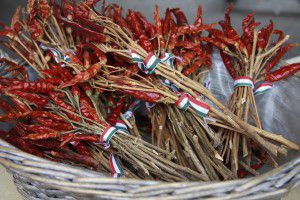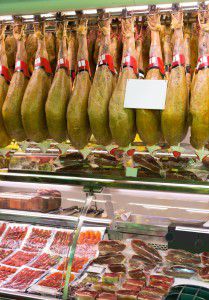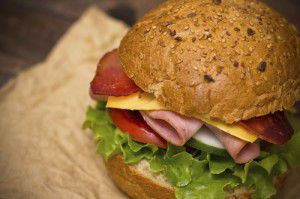Supermarket Swipe
I’m a Morrisons kind of girl.
And when I look longingly into my box of Yorkshire Tea and see nothing but tealeaf dust, I miss it.
I miss a store layout I recognise. I miss being a ble to identify what things are without imaginative guess work and Google Translate. But most of all, I miss English products.
ble to identify what things are without imaginative guess work and Google Translate. But most of all, I miss English products.
When you are far from home and craving custard, and the mere pronunciation of the word ‘vanilla’ fills shop assistants with mirth, you too will experience saudade at the thought of your local supermarket. Because supermarkets abroad sell all manner of things that you would not expect to find. And asking for help when you aren’t exactly sure what you’re asking for is everything from embarrassing to adventurous.
It’s tricky out there.
My fellow Brits abroad: on returning home, don’t be surprised if you feel the sudden urge to run into your nearest supermarket and pull the fishmonger into a tight embrace. Just make sure he doesn’t have a fish filleter in his hand when you do.
Still, never let it be said that there aren’t delightful discoveries to be made Out There. Here is a selection of my own that I haven’t yet decided if I am looking back on with fright or fondness.
China
China might be a bit of an outlier in the joy of supermarket shopping. The ones I went to were the full several-floor ‘we sell everything you can think of and probably some things you have nightmares about’ flavour, with counters offering up an array of unknowns and unidentifiables.
If you are an avid coffee drinker, it might be wise to take a stash of your own. Those crimes-against-coffee all-in-one sachets of coffee, milk powder and sugar are enough to make any coffee aficionado turn and weep.
Something that truly delighted me in Chinese supermarkets (and yes. I am easily amused) was that you can buy milk in pouches. Rather than the cartons we are used to in the UK, milk here – and expect a wide variety of dairy, soya and rice milk – is often sold in these thick, plastic pouches that have a satisfying squishy feeling when you juggle them in your hands. Not that you should really do that. Unless you want an audience.
Hungary
 Hungary is the land of paprika and sour cream. Paprika comes in different strengths of spiciness and there are either ‘regular’ or ‘sweet’ varieties to choose from. Sour cream (tejfol) has all sorts of uses in both sweet and savoury dishes, and you can buy it in all manner of sizes – from the small cartons arranged like pots of fromage frais, to the litres of the stuff in containers the size of those value packs of magnolia paint at B&Q. (It is also apparently a very effective ‘after sun’, but I’m not sure about that.)
Hungary is the land of paprika and sour cream. Paprika comes in different strengths of spiciness and there are either ‘regular’ or ‘sweet’ varieties to choose from. Sour cream (tejfol) has all sorts of uses in both sweet and savoury dishes, and you can buy it in all manner of sizes – from the small cartons arranged like pots of fromage frais, to the litres of the stuff in containers the size of those value packs of magnolia paint at B&Q. (It is also apparently a very effective ‘after sun’, but I’m not sure about that.)
Supermarkets in Hungary are generally smaller than you may be used to at home, but they are pretty well stocked. For some reason, apples are on the pricey side, but the fact that you can buy cherries (both normal and sour, which are delicious) and all manner of berries for a fraction of the price you’d pay at home more than compensates. Another surprising thing is that Spar is an actual supermarket, rather than the emergency-chocolate-fix kind of place that I am used to.
Spain
 Pig legs. Whole pig legs, right down to hoof, are dangled from ceilings and fanned out on counters in enticing displays. This is not a delicacy, but an everyday food product that you will find in many a Spanish kitchen. Ham is so important to Spaniards you could say it is part of the culture. From jamón serrano to jamón york, and a whole spectrum in between, you will never be short of ham if you need it.
Pig legs. Whole pig legs, right down to hoof, are dangled from ceilings and fanned out on counters in enticing displays. This is not a delicacy, but an everyday food product that you will find in many a Spanish kitchen. Ham is so important to Spaniards you could say it is part of the culture. From jamón serrano to jamón york, and a whole spectrum in between, you will never be short of ham if you need it.
For those of you who like to bake, be prepared to make some product replacement choices. Butter and margarine is available here but since most cook and bake with oil instead, and pour oil on their toast in the morning, you might not find exactly what you were looking for.
Alcohol is incredibly cheap here, and very good quality. Good wine is pretty much a given, and when you can buy nice cava for under two euros, or a can of beer for less than 30 cents, you can wonder at how people aren’t walking around constantly merry all day long.
There is a huge range of disposable products in Spanish supermarkets, including napkins, tissues and kitchen roll. And plates, bowls and cups. They even have the ‘balloon’ glasses in plastic form, just in case you decide on a cheeky gin and tonic on an impromptu picnic.
Finland
Our last whistle-stop on the supermarket tour is in the beautiful Finland, with large supermarkets of enough content to satisfy even the most dithering of customers (me). There are more varieties of sausage here than I have ever seen in my life, delicious rye breads, and very good cheese and salami.
One thing that threw me a little was an ‘addition’ to the toilet tissue aisle that I hadn’t anticipated. Since Finland is the land of the sauna, and more importantly, the all-naked sauna, there are disposable sauna ‘tissues seats’ for you to sit on that you can purchase in multipacks, ready for your public sauna experience. If you have your own sauna, and what self-respecting Finn doesn’t, you should of course purchase your own special sauna ‘pad’, which comes in a range of covers, colours and thicknesses. It is a whole new world.
These items might seem like an odd collection of things, and in many ways they are. But on a day when all you want is the home comfort of knowing in which aisle to find a tin of beans, good tea bags, and a bakewell tart, the call of the home supermarket is strong. Especially the bakery aisle. Oh, how I miss the bakery aisle…
Kelly
The emotional journey of a language learner
So. You’ve decided you want to speak another language. But as we all know, learning and knowing are two very different things, so brace yourself for the bumpy road ahead…
1. The optimistic early days
Hurrah! You’re going to learn a language, and it’s going to be easy, and fun, and you’re going to be fluent before you know it. Bring it on!
2. The study hours
So, with great enthusiasm, you buy books, download apps, spend days learning verb endings…
3. The reality check
Oh. Turns out this might not be as easy as you thought.
4. The tough days
Sometimes it’ll feel like nothing’s sinking in…
5. The lazy days
The sun’s out. Who wants to sit around studying? Let’s go to the beach!
6. The doubts
What if you make a mistake and embarrass yourself?
7. The panic
Or join in a conversation and then don’t understand a word?
8. The despair
You may even feel like giving up altogether.
But don’t – because it’s about to get good!
9. The first successful conversation
When you ask someone for an ice cream – and actually get what you asked for. The right flavour and everything…
10. The quiet satisfaction
When you impress people by telling them you speak another language.
11. That smug feeling
When you see a tourist struggling, and you can be the mysterious stranger who steps in and helps them out.
12. The sense of achievement
When you talk to someone in their language and they don’t immediately realise you’re from a different country.
And let’s not forget…
13. The new places you can discover
14. The new friends you’ll make
15. It even makes you smarter.
So what are you waiting for?
Music: Siyahamba
Today we have a musical treat for you! Here’s EuroTalk’s Safia and Nat singing South African hymn Siyahamba (which means ‘We are Marching’ in Zulu).
Enjoy!
A Hungry Conundrum
Learning a language is one thing… but what happens when that language changes depending where in the country you happen to be standing? That’s the subject of today’s blog post from Kelly – if you’ve encountered any of these regional confusions, we’d love to hear about them!
When is a roll a cake?
Before you break out your finest John Shuttleworth impression in fear of pudding before main, there is actually a very good answer to this.
Because unless you’ve never ventured further than your local shops and the thought of travelling to the next borough, town or neighbourhood fills you with a sense of dread, you’ve probably noticed that local words for things vary.
We don’t necessarily mean profound things like finding yourself receiving a chocolate biscuit when you asked for a custard cream (no complaint there really but still, confusing), but honestly, there is a minefield of potential outrage and disappointment out there if you’re not sure what you’re asking for.
Be careful where you ask for a ride, for example.
Back to our conundrum.
Escaping the Smoke
 When I left that there London many years ago from the pigeon-infested Victoria Coach Station on a one-way journey to Yorkshire, I’m pretty sure in my possession was a copy of Kerrang, a selection of confectionary, and a bread roll containing cheese and pickle.
When I left that there London many years ago from the pigeon-infested Victoria Coach Station on a one-way journey to Yorkshire, I’m pretty sure in my possession was a copy of Kerrang, a selection of confectionary, and a bread roll containing cheese and pickle.
Somewhere along the M1 that innocent-sounding sandwich was eaten, but had it remained intact, a magical thing would have happened to it. For on the journey North, it would have transformed from a roll, to a batch, to a cob, perhaps to a scuffler (I forget the exact National Express route…) before finally settling on being a breadcake.
In Britain, even wheat-based products have identity crises.
How do you say…
English is a diverse language for both native and non-native speakers alike, but think how much more embarrassing it is for a native speaker not being able to order something in their own country in their own tongue. We normally reserve such ridicule for when we travel abroad unprepared, in the arrogant but not-so-naive knowledge that English is spoken everywhere. But on our own doorstep, a quick weekend away can mean an unwanted education in local colloquial vocabulary.
Perhaps it would be easier to stick to the tourist move of pointing at the menu and blinking mutely.
 Another area of confusion could be the names for mealtimes. There is a fond memory of a misunderstanding over tea and dinner time. An offer of tea to a friend was met with an expectation of milk, sugar, and possibly biscuits, but when the option presented was tuna and sweetcorn, it was rapidly declined. With a horrified expression that said, ‘who are you people? What are you doing to the sanctity of the cup of tea???’, a friendship was on the brink. Because breakfast, lunch and dinner can also be breakfast, dinner and tea, depending where you are in our humble isle. (The tuna and sweetcorn was for a jacket potato, in case you were wondering).
Another area of confusion could be the names for mealtimes. There is a fond memory of a misunderstanding over tea and dinner time. An offer of tea to a friend was met with an expectation of milk, sugar, and possibly biscuits, but when the option presented was tuna and sweetcorn, it was rapidly declined. With a horrified expression that said, ‘who are you people? What are you doing to the sanctity of the cup of tea???’, a friendship was on the brink. Because breakfast, lunch and dinner can also be breakfast, dinner and tea, depending where you are in our humble isle. (The tuna and sweetcorn was for a jacket potato, in case you were wondering).
And another thing…!
While we’re on our home-away-from-home soapbox, can we take this opportunity to complain about the options available for a ‘pattie’ in your local fish and chip shop? Because again, depending on where you go, this could be fish, potato, fish and potato, potato in a mixture resembling bubble and squeak… There are probably more variations too, and one place we really don’t want to be confused is our chippy. Next you’ll be debating if the perfect side is mushy peas, curry sauce or gravy, and it’s all too delicate a subject for us to deal with without serious, in depth thought. To quote Hot Pie, “you cannot give up on the gravy.”
See? Now look what’s happened. We’re hungry and we want pie. But when is a pie not a pie?
That’s it. Time for a pub lunch.
Wetherspoons, anyone?
Kelly
uTalk Election: a guide to political jargon
It’s General Election Day here in the UK, and as (hopefully) everyone heads to the polls to cast their vote, we’ve been considering some of the strange vocabulary associated with politics. Sometimes it can seem like a whole new language, so we’ve put together a little guide to a few of our favourites. Has anyone got any more examples to add?
Psephology
The scientific study of historical voting and voting patterns. The word is derived from the Greek psēphos which means pebble; the ancient Greeks used pebbles in voting.
Gerrymandering
When the borders of an electoral constituency are changed, resulting in an increased number of people in that area who’ll vote for a particular party or candidate.
Manifesto
From the Italian word meaning ‘clear’ or ‘obvious’, in election terms a manifesto is a public statement of a party or candidate’s intentions and promises, should they be elected.
Chiltern Hundreds
Members of Parliament aren’t officially allowed to resign their seat, so in order to do it they have to go through a legal procedure known as ‘taking the Chiltern Hundreds’. This involves them being elected to an ‘office of profit’, which means they can’t be an MP any more. The procedure was invented by John Pitt in 1750, when he was appointed as Steward of the Chiltern Hundreds in order to resign his seat and take another.
Hung Parliament
This is what happens when no party gets a clear majority and therefore can’t form a government, so one or more parties may form a coalition – as happened in the UK in 2010 – or another election may be necessary.
Red Lines
The promises made by a party that they won’t change and on which they’re not prepared to negotiate, even if they find themselves part of a coalition government.
Landslide
When one party wins by a large majority: a landslide of votes.
Purdah
The period immediately before an election, usually six weeks. During this time, there are restrictions on the announcement of new government initiatives or policy decisions, which could give one party an advantage over others.
Floating voters
People who haven’t quite made up their minds yet on who to vote for – and who are therefore a target for campaigning candidates.
Swithering
Much like a floating voter, this is someone who switches their allegiance from one party to another in the run-up to the election.
Canvassing
Nothing to do with tents, this is when a candidate and their team speak to voters face to face (or sometimes by telephone) before an election. The main purpose of canvassing is to find out how people intend to vote and identify supporters.
If you’ve got an interesting word or phrase to add to our list, let us know in the comments!



